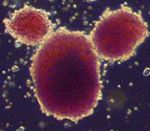Hope Arises For Heart Treatment After Successful Rats Experimentation

An observational stem cell treatment that has proved successful in rats could bring about an off-the-shelf heart repair treatment for heart failure patients.
Researchers have used human embryonic stem cells to regrow the heart muscles of rats that had survived lab-induced heart failures. The injected cells resulted to recovery of the heart's activity and stimulated the growth of new blood vessels.
Having displayed that the procedure works in rats, the group is trying it in sheep whose pulse rate and size is closer to human beings. If these are prosperous, experimental tests in humans will follow.
Heart failures are caused when cardiac muscle drops off its blood supply, frequently as the arterial blood vessels become furred. Muscle fibers in the oxygen-starved part break down and form a scar that lessens the heart’s capacity to pump. The cure involves interjecting cardiac muscle cells from human embryonic stem cells on to the internal surface of the heart ventricles.
The group reported in Nature Biotechnology that one stumbling block has been forbidding the extra cells from breaking down, but the group chaired by Charles Murray at the University of Washington and including research workers at the healthcare company Geron, have formulated what they call a "survival cocktail" of chemical indications, which forbids this.
Prof Murray said, “The problem of cell death is pretty common in stem-cell treatment. When we try to regenerate with liquid tissues, like blood or bone marrow, we're pretty good at it, but we haven't been very successful with solid tissues. This is one of the most successful attempts so far using cells to repair solid tissues.”
Mr. Geron desires to bring in the cure as an off-the-shelf remedy for heart attacks.